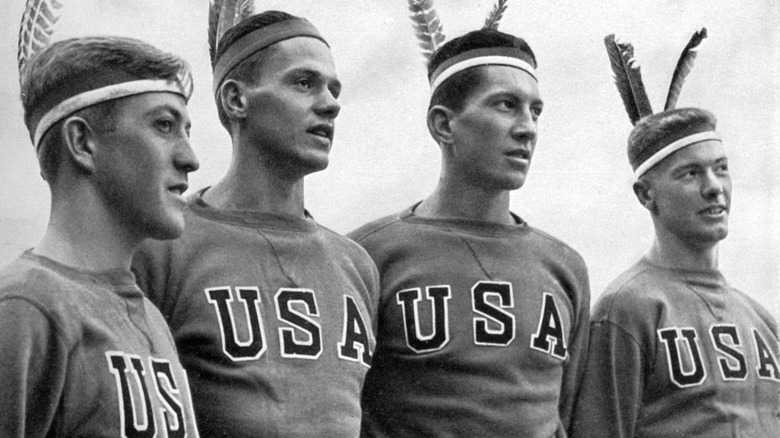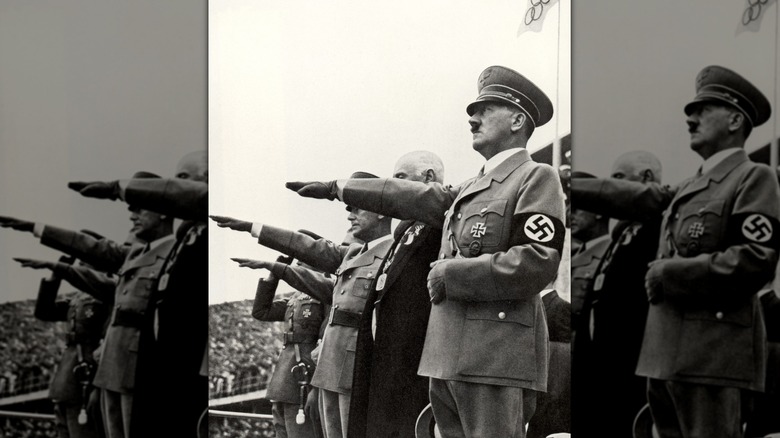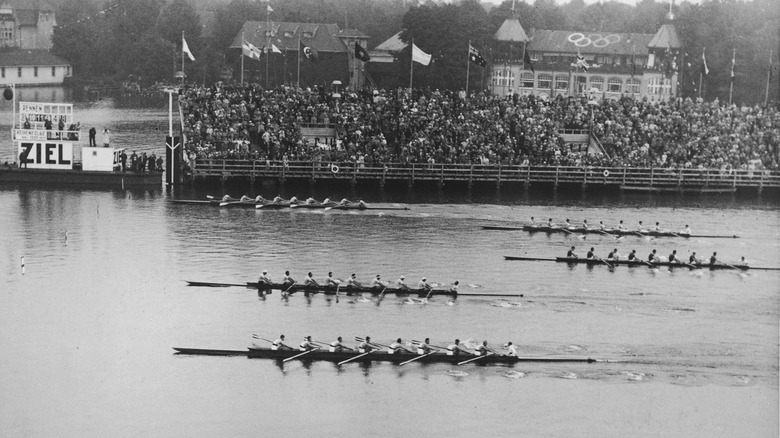The American Rowing Team That Upset Hitler's Plans At The 1936 Olympics
Joe Rantz had no obvious path to the Olympics. He was a poor boy abandoned by his father and stepmother who had to use soup kitchens and shelters while putting himself through school (per Time). Don Hume was physically unremarkable and had damaged lungs from a youthful stint working in a pulp mill (per PBS). Bob Moch was an asthmatic boy from a working-class family. When these and other young men, mostly from lower or working-class backgrounds, came together as rowers for the University of Washington, they clashed with their coach, with rival teams from back east, and with each other.
Yet this uneasy combination of young men outperformed Ivy League competition in the trials to represent America in the rowing event of the 1936 Olympics. Winning the trials didn't immediately secure their passage to the games, however. Per Slate, the team was obliged to pay their own way, and the University of Pennsylvania sought to take advantage of their financial limits. But a campaign by Seattle newspapers and newsboys raised the money and put the Husky rowers on the S.S. Manhattan, bound for the Olympics. There, the unlikely team would take the gold and foil the designs of their hosts — Nazi Germany and Adolf Hitler.
Hitler wanted the Olympics to be a propaganda triumph for Germany
In Adolf Hitler's mind, the 1936 Olympic Games were a golden opportunity for Germany, and not simply on account of the prestige of hosting an international event. Germany won the bid to host the Olympics two years before Hitler came to power (per Britannica), but having won control of the government by the time the games arrived, he wanted them to serve as the ultimate piece of Nazi propaganda. It was a platform to show fascism's success at unifying the nation, engineering its economic resurrection, and confirming what they believed was the inherent superiority of the Aryan race.
The ugliness and brutality of Nazism had become apparent to many on the world stage by 1936, and per the Holocaust Encyclopedia, there was a concerted effort to boycott the German-hosted Olympics. To have a chance to demonstrate their ideology, the Nazis had to tone down their rhetoric (per Time). That didn't stop them from denying Jewish athletes almost any participation in German teams, and it didn't stop other nations from pulling Jewish athletes to avoid offending the host nation. But it did help buy Germany some good press and may have even worked against antifascist sentiments from the early 1930s.
Besides going mum on their most hateful talking points, the Nazis did everything they could to sanitize Berlin before the Olympics began. According to PBS's "The Boys of '36," the University of Washington rowers arrived in a clean, organized city with swastikas everywhere. And the leader of their host nation expected the German teams to sweep the events.
The American rowers' victory came after a series of disasters
The final race of the 1936 Olympics rowing event was one disaster after another for the American team. According to Slate, two team members got sick on the journey to Europe, an illness that persisted into the competition for stroke Don Hume. The qualifying round had a nail-biting finish. When it came time for the final, according to The Seattle Times, the Americans were put in Lane 6 (the most exposed to inclement weather), and they missed the sound signaling the start of the race.
Germany had already taken five gold and one silver medal in the preceding rowing events, and Adolf Hitler and the top Nazi brass were waiting at the finish line of the final (per Time). At the halfway point in the race, the team from Washington State was dead last. The Germans and Italians were leading, and per The Seattle Times, coxswain Bob Moch had to bang on the boat to set the pace because he couldn't be heard by his teammates over the cheering crowd. Hume looked as if he was passed out. But he rallied just in time. Going at what was later estimated to be 45 strokes per minute, the Americans pulled ahead of Germany and Italy to clinch the gold.
Hitler's reaction to the American victory wasn't recorded, but author Daniel James Brown told Time that the dictator made it a point not to congratulate the winning team. Not that it mattered to them. "We didn't give a d*** about Hitler," Moch told Slate. "We were there to do a job."


